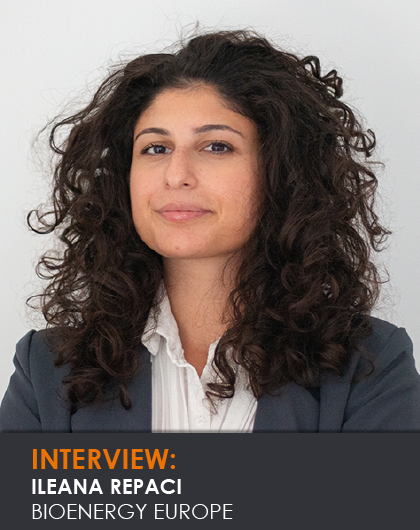Ileana Repaci from Bioenergy Europe on what you have to know about EUDR
The EU Deforestation Regulation (EUDR) is an important topic that concerns the certified companies. Therefore, we have invited our colleague Ileana Repaci who is an advocacy assistant at Bioenergy Europe to explain this new regulation and help us prepare for it.
Hi Ileana, what is the EU Deforestation Regulation (EUDR) all about?
The EU Deforestation Regulation (EUDR) aims to tackle global deforestation and forest degradation by ensuring that only products which are deforestation-free, forest degradation free and legally produced can enter, be commercialized within, or exit the EU market. It covers a wide range of products such as soy, palm oil, cocoa, coffee, rubber, and wood, along with wood-based products like fuel wood, wood charcoal and derived products. The full list is available here (Annex I). The regulation establishes due diligence requirements for operators involved in the whole supply chain, ensuring that these products were not supplied through illegal deforestation, forest degradation, or violation of local laws in the countries of origin.
How does it affect the wood pellet producers and traders? What are their obligations and in what cases?
The regulation affects wood pellet producers and traders because wood is included in its scope. Producers must ensure that the wood used for pellets is sourced in a way that complies with the Regulation. Operators (who put or export products in the Union market for the first time) must ensure that the products are deforestation free, forest degradation free and legally produced through a due diligence statement. They will have to collect information (including geolocation data) and carry out risk assessment or, in case of no risk or negligible risk, risk mitigation.
Traders (who make products available on the EU market in the course of a commercial activity) will not need to produce a due diligence statement. However, they should collect information on buyers and suppliers and the reference number of their due diligence statement, and store that information for 5 years.
In order to understand the difference between operators and traders, take a look at the graph here below:

Company A and Company C are both “operators” as they are putting fuel wood in the Union market for the first time. Company D is a trader, because it is taking fuel wood already in the market and commercialise it. Instead, Company B is processing the fuel wood and making it into wood charcoal, thus placing wood charcoal, a new product, in the market for the first time. Therefore, Company B is an operator.
On the other hand, Company E is taking fuel wood and making electricity. Since electricity does not fall within the scope of products covered by the EUDR, Company E is not covered by this regulation.
Do economic operators need to register in the Information System of the EU Deforestation Regulation and use it to make electronic Due Diligence Statements? Tell us about this tool and its role in the process.
Yes, economic operators need to register in the EUDR Information System. This system, called Traces, is a registry of due diligence statements that allows operators, traders and their representatives to make electronic due diligence statements and submit them to the relevant authorities to show that they comply with the Regulation. Origin (including geolocation), details of the product (HS code, description and quantity) should be included.
Operators further down the supply chain and traders (within the EU) can refer back to due diligence statements created by others before them, without having to produce a new one.
What important deadlines should we have in mind in regard to the regulation? Any piece of advice you want to share?
The Regulation will be applied starting from December 31st 2025. For SMEs that do not already fall within the scope of EUTR (European Timber Regulation) the application date is June 30th 2026.
This means that operators and traders have until the end of the year to comply with the Regulation. My advice would be to start preparing by ensuring supply chain transparency, gathering information on sourcing practices, and conducting internal audits. It is important to stay ahead of the deadlines to avoid delays or fines.
The Commission has made available a Guidance Document and FAQs on the EUDR Regulation which can be helpful in understanding the Regulation and the necessary steps to comply with it.
As Bioenergy Europe, we are trying to push for simplification of compliance to the regulation by advocating for its inclusion in the Ombnibus package. To know more about our advocacy work, you can visit Bioenergy Europe.

